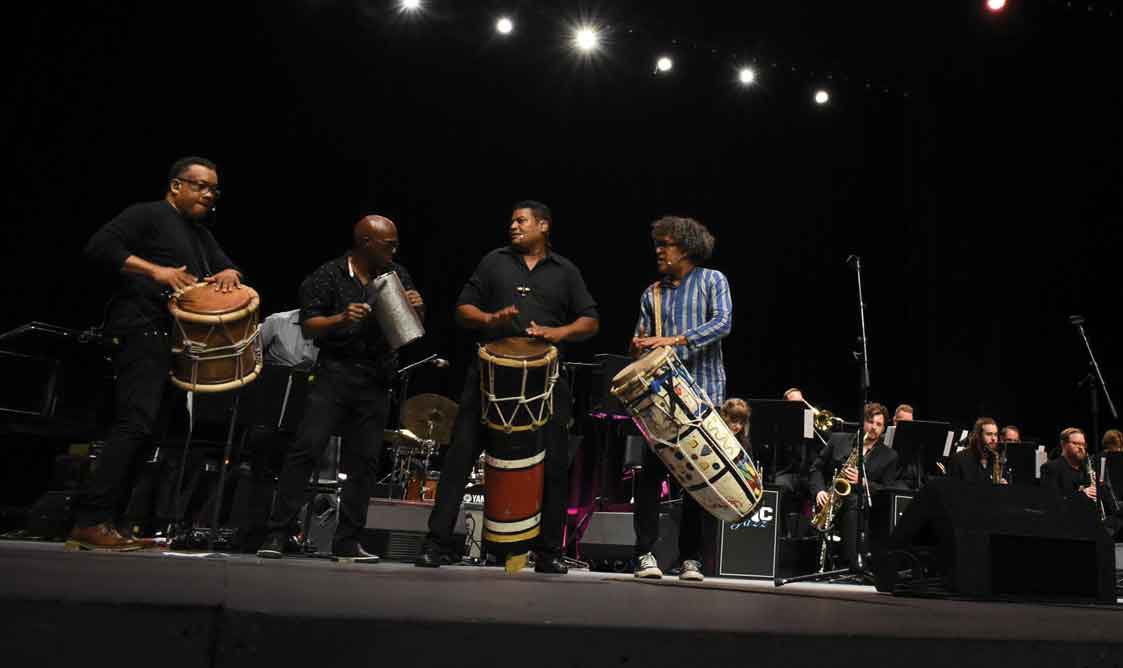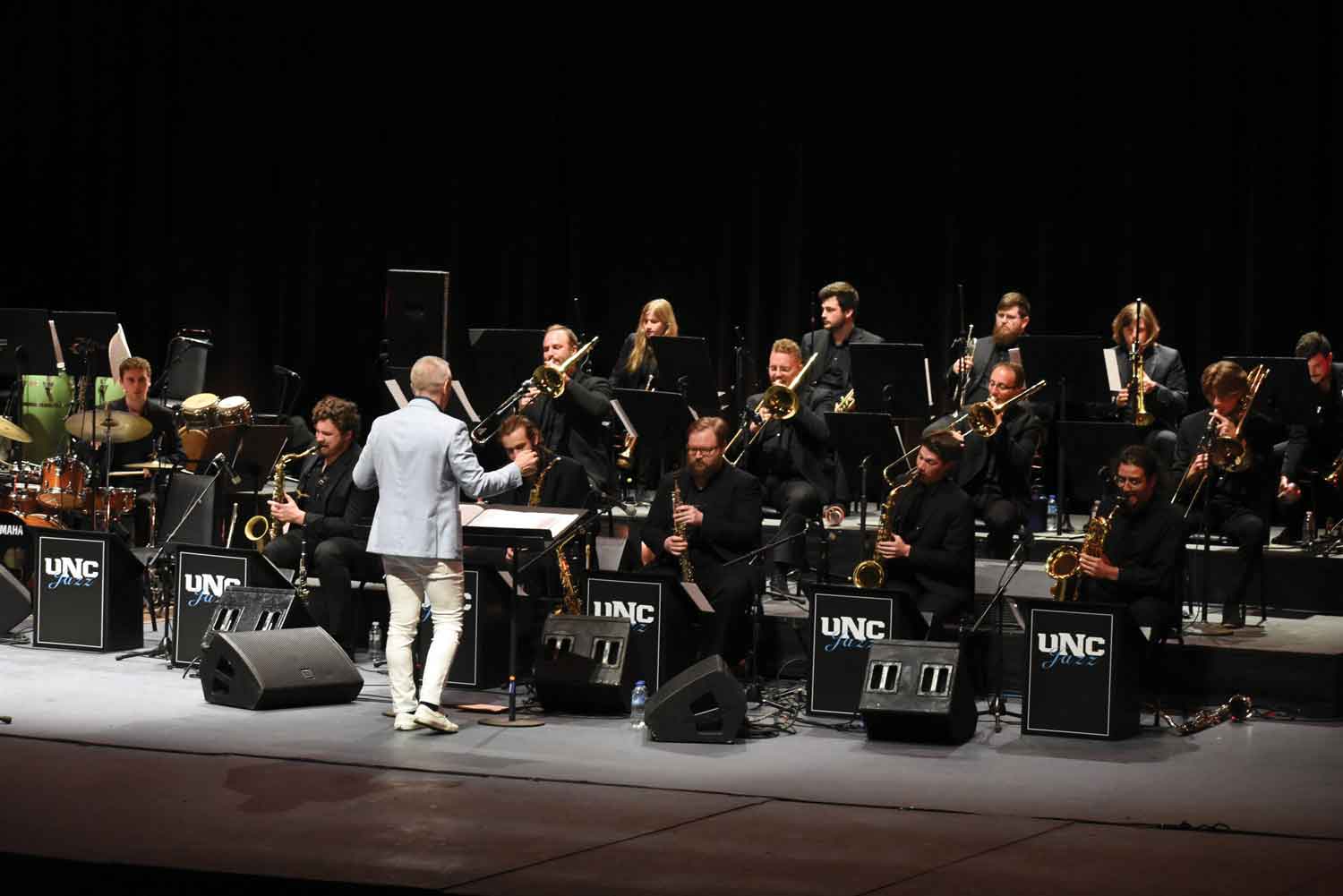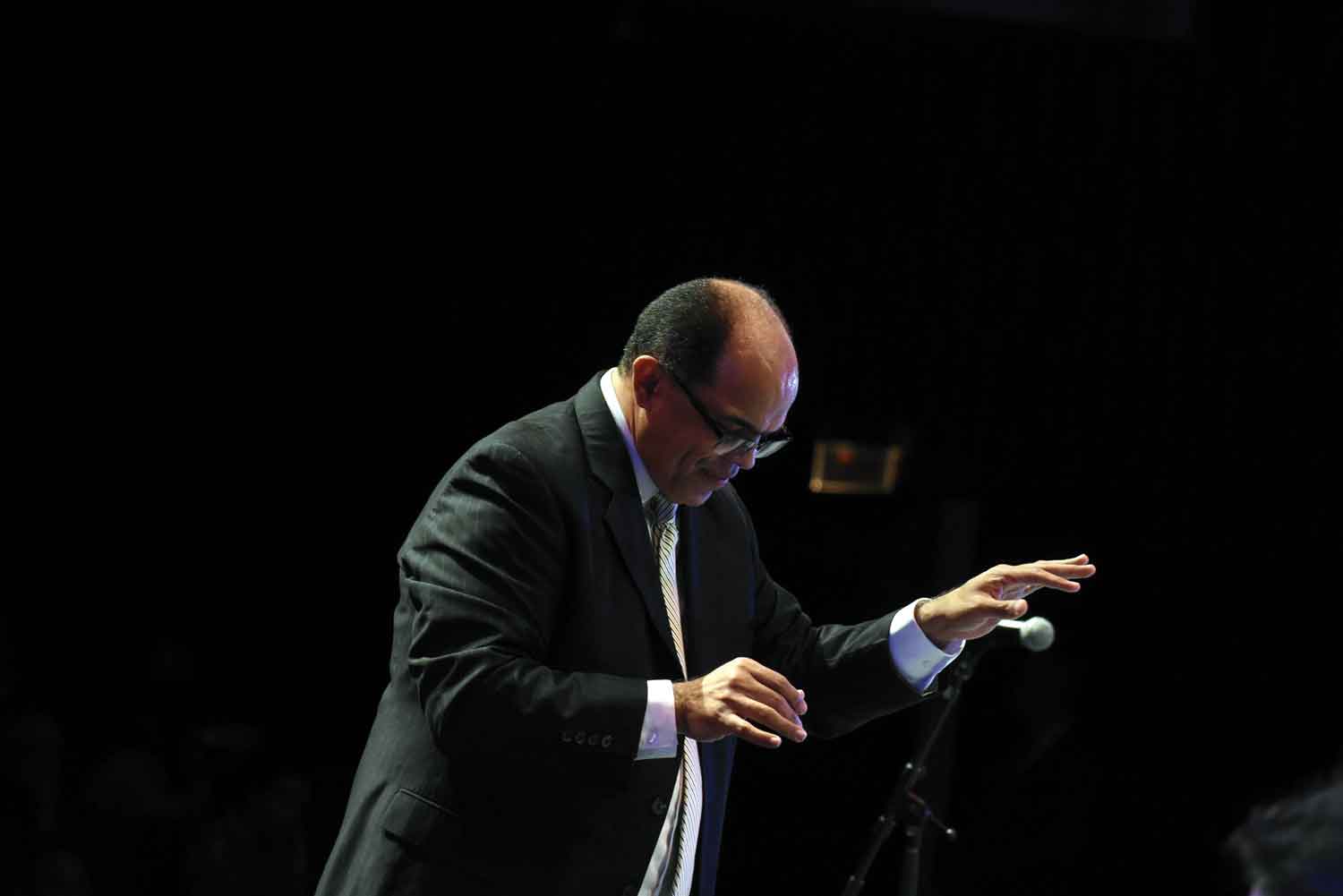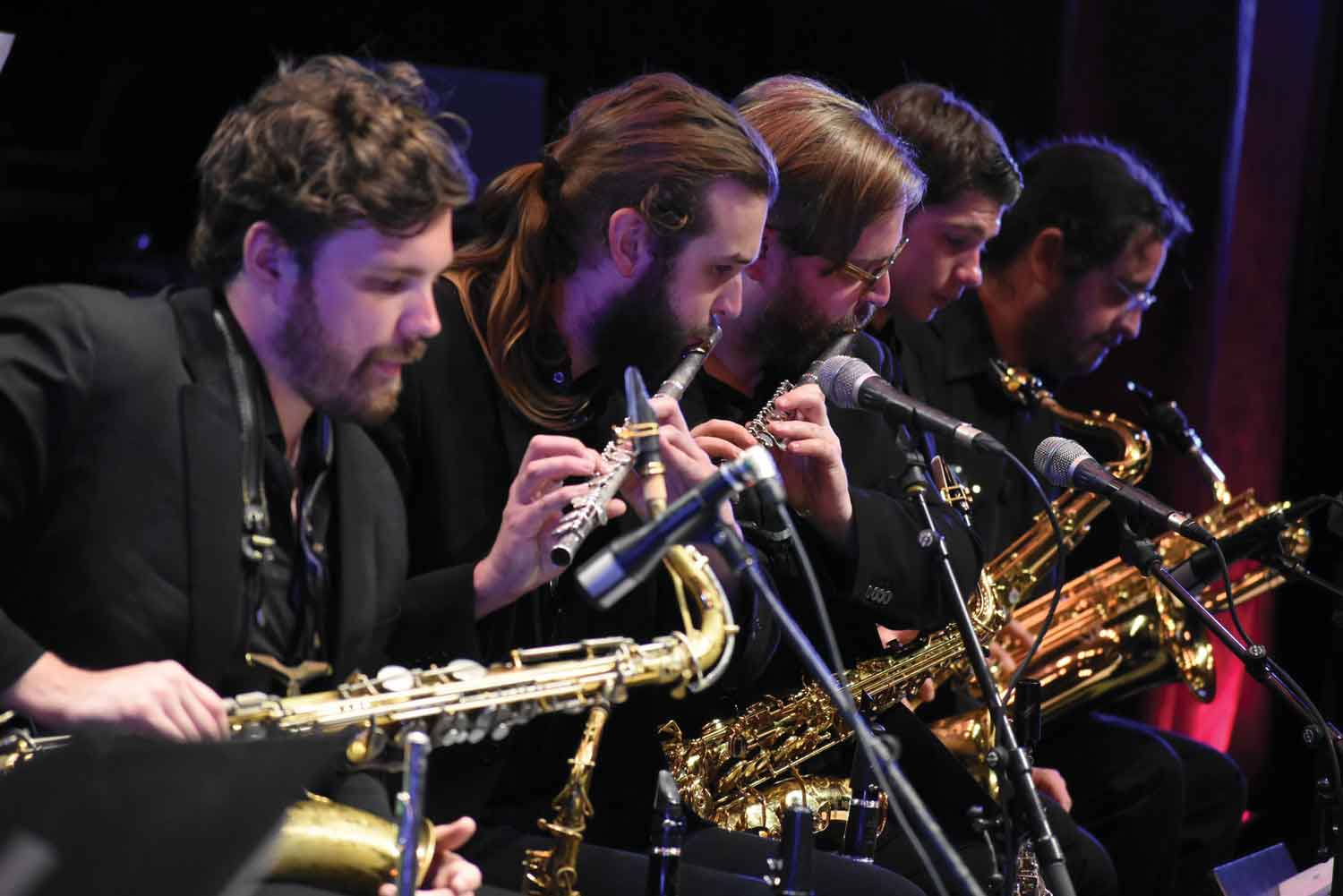Performing and Visual Arts students take their talents on the road to the delight of audiences in New York City, the Dominican Republic and the Czech Republic.
While experiential learning may not only be in vogue but essential to student success in higher education, it’s usually relegated to those fortunate enough to afford the cost of such experiences, such as studying abroad.
For College of Performing and Visual Arts (PVA) Dean Cristina Goletti, MFA, this is something she hopes to tackle at UNC as she begins her third year.
Goletti sees these trips as not just about experiential learning, but also about cultural immersion and on-the-job training for a wide array of students.
“Because of the socioeconomic background of many students who come to UNC, we must acknowledge that not everyone has the resources to travel. Since these experiences are very important and we want to provide them, it is crucial that we find the necessary resources.”
When the Dominican Republic’s Director of the National Theatre invited PVA Professor of Music, Socrates Garcia, D.A., ’13, to perform in Santo Domingo around its 50th anniversary, Goletti thought about how to make the most of the trip for students, faculty and staff. This is the definitive example of experiential learning, which is the process of learning by doing, and includes internships, apprenticeships, studying abroad, field research and more, according to the Institute for Study Abroad.
What resulted was a week-long trip for more than 40 university performers who led workshops, attended classes, gave lessons and, ultimately, performed at the national theatre, Teatro Nacional Eduardo Brito, which was packed with 2,000 people, including the Vice Minister of Culture and the U.S. Ambassador to the Dominican Republic. The trip was made possible by a grant from the U.S. Embassy.
With its long and storied history and musical traditions, the Compass Jazz Orchestra, the university’s premier jazz ensemble, learned much about the roots of Afro-Latino and Afro-Cuban jazz music, especially by playing with an all-Dominican drum line comprising iconic figures of the island’s jazz scene, including Felix Garcia “El Abuelo”, Raul Sanchez, Ramon “Papatin” de Castro, Edis “El Guru” Sanchez, Leo Pimentel and Javier Vargas.
The trip to the Dominican Republic was just one of three experiential trips PVA students participated in 2023. More than 90 choir students traveled to New York City to perform at the illustrious Carnegie Hall and five Design and Technology students built and displayed an interactive installation of objects and the personal stories behind them in the Czech Republic at The Prague Quadrennial of Performance Design and Space. The former was established in 1967 to bring the best of design for performance, scenography and theatre architecture to the front line of cultural activities.
All of the experiences were made possible, in part, thanks to the PVA Student Travel Experiences Fund supported by the generosity of alumni and donors.
Goletti championed the creation of the student travel fund, which was launched as part of the 2023 Bears Give Back Day of Giving and is now a permanent fund donors can support. Gifts to this fund directly support experiences such as the three outside-the-classroom experiences in 2023.
Much like student experiences in the other four colleges, these serve as on-the-job experiences for PVA students, which is critical to their professional success.
“The arts are not something you just do for passion. While passion is important, it’s a career,” Goletti said.
Socrates Garcia, who is the director of Music Technology, said the experience for his students in Santo Domingo was one-of-a-kind.
“It was a dream come true … we had been talking about it for 10 years … I hope it opens a lot of doors for UNC,” Garcia said. “The students were ecstatic. You could see it. They were bubbling.”
For Tom Call, a Jazz Studies doctoral student, it was a chance to bridge cultural and musical barriers.
“As a composer and performer, it was an incredible opportunity and honor to have the chance to share my music with the world in this small way. And I look forward to exploring the music and ideas that were shared with us on this cultural exchange,” Call said.
For Brian Hapcic, professor of lighting and sound design, he wanted to give his students an experience similar to what he felt as a participant at The Prague Quadrennial of Performance Design and Space in 2015.
Hapcic hand-picked five seniors he knew were up to the challenge of creating a theatrical installation for the Prague competition Festival of the Rare. Working with the theme, What is Rare in Society, Hapcic’s students spent the fall 2022 semester envisioning the answer to this question in a way that would be experiential for an audience. They were doing something called scenography, which includes the use of scenic design, lighting design, sound design and costume design to craft a stage environment or atmosphere.
The students thought about how polarized the world has become and how charged political conversations can result in people not really listening to each other. That’s when they invited members of the community to bring in objects and record their stories about them, which would create a much more inclusive and intimate experience. Those objects were then collected in an installation, Can Your Hear Me, and each was labeled with a QR code, which the audience could scan to play the owner’s recording.
Hapcic said the students had the experience of a lifetime in Prague.
“They were all blown away, of course, like I was in 2015...they will carry some of these ideas with them into the world,” Hapcic said. “Only 12-13 schools were selected out of 40 worldwide.”
Finally, for the choir trip to Carnegie Hall, Choir Director Jill Burgett, D.A., needed to find a way to fund more than 90 students traveling, lodging and dining in New York, an expensive endeavor.
The student travel fund provided $124,000 for the trip, which enabled more than 90 UNC students to perform Carl Orff’s Carmina Burana to a nearly packed house.
The inaugural debut of the UNC Choir at Carnegie Hall impressed Burgett, the students and alumni alike.
Catherine Freeland, ’96, who studied acting at PVA, and has lived in New York for 10 years but hadn’t had a chance to visit Carnegie Hall, was at the performance.
“Going to hear the choirs from my alma mater in that famous space was electrifying. The performance was superb, and I was truly the proudest I’ve ever been to be a UNC Bear,” Freeland said.
For Goletti, all these opportunities are an effective way to get UNC’s name out into the world of performing and visual arts and raise the visibility of the university to national and global audiences as an excellent place to study the arts, both at the undergraduate and graduate level.
While she was in the Dominican Republic, for example, Goletti met with the Vice Minister of Higher Education about opportunities for college graduates from that country to continue their doctoral studies at UNC as there are no graduate programs in music in Santo Domingo.
It’s also about getting UNC students out onto the world stage, which takes additional funding to make possible.
According to CNBC, “The cost of studying abroad may be one of the biggest deciding factors in who gets to go. Students who come from demographics more likely to be able to afford the extra cost — such as those from wealthy families, who are disproportionately white — seem to be more likely to go abroad.”
While these PVA trips are less time-intensive, they do open doors for students.
“There’s a different experience as a performer when you walk on the Carnegie Hall stage. It means something different; you feel you are part of a tradition. You are stepping onto a stage where the biggest composers, singers and performers have been,” Goletti said.
“These are deep educational experiences,” Goletti said. “Your knowledge goes up a notch. The exponential growth that can happen through these trips is incredible.”
According to Farouk Dey, Ph.D., vice provost for integrative learning and life design at Johns Hopkins University in Baltimore, such experiences are critical. As one of LinkedIn’s Top 10 Voices in Education, he is recognized for his research on the future of work, and diversity, equity and inclusion.
“These experiences are just too important to miss. They are the experiences that prepare students for the workforce, the experiences that expand students’ minds and expand their networks,” Dey said.
“They are the experiences that inspire students to make bold decisions and audacious moves.”
Photos from Performing and Visual Arts faculty, staff and students





